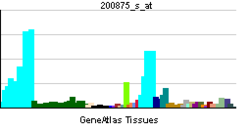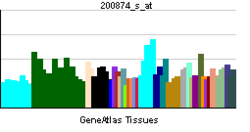- NOL5A
-
NOP56 ribonucleoprotein homolog (yeast) Identifiers Symbols NOP56; NOL5A; SCA36 External IDs MGI: 1914384 HomoloGene: 4660 GeneCards: NOP56 Gene Gene Ontology Molecular function • RNA binding
• protein binding
• snoRNA bindingCellular component • nucleus
• nucleolus
• small nucleolar ribonucleoprotein complex
• box C/D snoRNP complex
• pre-snoRNP complexBiological process • rRNA processing Sources: Amigo / QuickGO RNA expression pattern 

More reference expression data Orthologs Species Human Mouse Entrez 10528 67134 Ensembl ENSG00000101361 ENSMUSG00000027405 UniProt O00567 n/a RefSeq (mRNA) NM_006392.2 NM_024193.2 RefSeq (protein) NP_006383 NP_077155.2 Location (UCSC) Chr 20:
2.63 – 2.64 MbChr 2:
130.1 – 130.11 MbPubMed search [1] [2] Nucleolar protein 56 is a protein that in humans is encoded by the NOP56 gene.[1][2]
Nop56p is a yeast nucleolar protein that is part of a complex with the nucleolar proteins Nop58p and fibrillarin. Nop56p is required for assembly of the 60S ribosomal subunit and is involved in pre-rRNA processing. The protein encoded by this gene is similar in sequence to Nop56p and is also found in the nucleolus. Multiple transcript variants encoding several different isoforms have been found for this gene, but the full-length nature of most of them have not been determined.[2]
References
- ^ Gautier T, Berges T, Tollervey D, Hurt E (Dec 1997). "Nucleolar KKE/D repeat proteins Nop56p and Nop58p interact with Nop1p and are required for ribosome biogenesis". Mol Cell Biol 17 (12): 7088–98. PMC 232565. PMID 9372940. http://www.pubmedcentral.nih.gov/articlerender.fcgi?tool=pmcentrez&artid=232565.
- ^ a b "Entrez Gene: NOL5A nucleolar protein 5A (56kDa with KKE/D repeat)". http://www.ncbi.nlm.nih.gov/sites/entrez?Db=gene&Cmd=ShowDetailView&TermToSearch=10528.
Further reading
- Deloukas P, Matthews LH, Ashurst J et al. (2002). "The DNA sequence and comparative analysis of human chromosome 20". Nature 414 (6866): 865–71. doi:10.1038/414865a. PMID 11780052.
- Andersen JS, Lyon CE, Fox AH et al. (2002). "Directed proteomic analysis of the human nucleolus". Curr. Biol. 12 (1): 1–11. doi:10.1016/S0960-9822(01)00650-9. PMID 11790298.
- Watkins NJ, Dickmanns A, Lührmann R (2003). "Conserved stem II of the box C/D motif is essential for nucleolar localization and is required, along with the 15.5K protein, for the hierarchical assembly of the box C/D snoRNP". Mol. Cell. Biol. 22 (23): 8342–52. doi:10.1128/MCB.22.23.8342-8352.2002. PMC 134055. PMID 12417735. http://www.pubmedcentral.nih.gov/articlerender.fcgi?tool=pmcentrez&artid=134055.
- Scherl A, Couté Y, Déon C et al. (2003). "Functional proteomic analysis of human nucleolus". Mol. Biol. Cell 13 (11): 4100–9. doi:10.1091/mbc.E02-05-0271. PMC 133617. PMID 12429849. http://www.pubmedcentral.nih.gov/articlerender.fcgi?tool=pmcentrez&artid=133617.
- Strausberg RL, Feingold EA, Grouse LH et al. (2003). "Generation and initial analysis of more than 15,000 full-length human and mouse cDNA sequences". Proc. Natl. Acad. Sci. U.S.A. 99 (26): 16899–903. doi:10.1073/pnas.242603899. PMC 139241. PMID 12477932. http://www.pubmedcentral.nih.gov/articlerender.fcgi?tool=pmcentrez&artid=139241.
- Hayano T, Yanagida M, Yamauchi Y et al. (2003). "Proteomic analysis of human Nop56p-associated pre-ribosomal ribonucleoprotein complexes. Possible link between Nop56p and the nucleolar protein treacle responsible for Treacher Collins syndrome". J. Biol. Chem. 278 (36): 34309–19. doi:10.1074/jbc.M304304200. PMID 12777385.
- Ota T, Suzuki Y, Nishikawa T et al. (2004). "Complete sequencing and characterization of 21,243 full-length human cDNAs". Nat. Genet. 36 (1): 40–5. doi:10.1038/ng1285. PMID 14702039.
- Hassel S, Eichner A, Yakymovych M et al. (2004). "Proteins associated with type II bone morphogenetic protein receptor (BMPR-II) and identified by two-dimensional gel electrophoresis and mass spectrometry". Proteomics 4 (5): 1346–58. doi:10.1002/pmic.200300770. PMID 15188402.
- Gerhard DS, Wagner L, Feingold EA et al. (2004). "The status, quality, and expansion of the NIH full-length cDNA project: the Mammalian Gene Collection (MGC)". Genome Res. 14 (10B): 2121–7. doi:10.1101/gr.2596504. PMC 528928. PMID 15489334. http://www.pubmedcentral.nih.gov/articlerender.fcgi?tool=pmcentrez&artid=528928.
- Watkins NJ, Lemm I, Ingelfinger D et al. (2005). "Assembly and maturation of the U3 snoRNP in the nucleoplasm in a large dynamic multiprotein complex". Mol. Cell 16 (5): 789–98. doi:10.1016/j.molcel.2004.11.012. PMID 15574333.
- Andersen JS, Lam YW, Leung AK et al. (2005). "Nucleolar proteome dynamics". Nature 433 (7021): 77–83. doi:10.1038/nature03207. PMID 15635413.
- Nousiainen M, Silljé HH, Sauer G et al. (2006). "Phosphoproteome analysis of the human mitotic spindle". Proc. Natl. Acad. Sci. U.S.A. 103 (14): 5391–6. doi:10.1073/pnas.0507066103. PMC 1459365. PMID 16565220. http://www.pubmedcentral.nih.gov/articlerender.fcgi?tool=pmcentrez&artid=1459365.
- Olsen JV, Blagoev B, Gnad F et al. (2006). "Global, in vivo, and site-specific phosphorylation dynamics in signaling networks". Cell 127 (3): 635–48. doi:10.1016/j.cell.2006.09.026. PMID 17081983.
Categories:- Human proteins
- Chromosome 20 gene stubs
Wikimedia Foundation. 2010.
